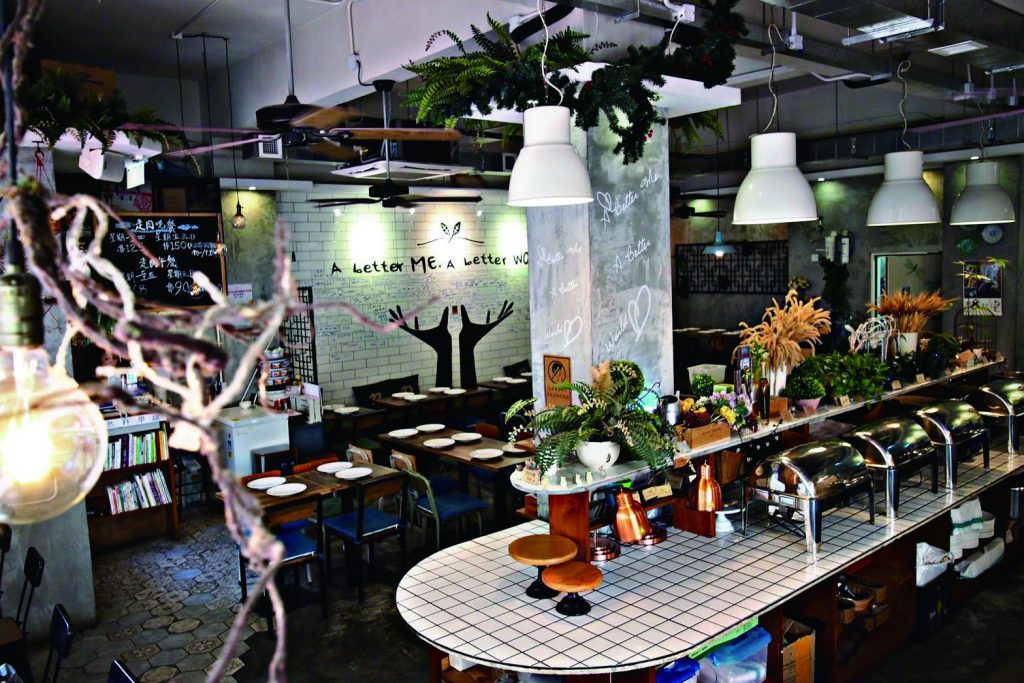Modern vegetarian eateries are emerging, in response to the rising demand for plant-based dishes.
By Hayley Wong
Po Chen founded her vegan bubble tea store in Central in August 2020, the first of its kind in Hong Kong.
“I want to turn bubble tea into something healthy, homemade and vegan so that it wouldn’t be a problem for my children to drink bubble tea every day,” Chen says.
Chen’s bubble tea does not contain refined sugar, but natural, low-glycemic alternatives like coconut sugar and lakanto monkfruit sugar. Chen uses oat milk, almond milk, and hempseed milk to replace dairy milk which is used by most bubble tea stores. They are higher in fibre, anti-inflammatory and contain no lactose.

Chen says there is a rising demand for plant-based food options in Hong Kong. “Oat milk and vegetarian meat brands have been widely added to retail and restaurant menus,” she says. “I do think Hong Kong has the potential to develop further on vegetarian catering options, especially during the pandemic when everybody pays more attention to their health.”
Increasing Popularity of Plant-based Diet
According to British Dietetic Association, a plant-based diet is based on food derived from plants with few or no animal products.
While only three per cent of the population in Hong Kong are full-time vegetarians or vegans, 34 per cent of the 1,000 respondents adopt a plant-based diet at least one day a week, according to the Hong Kong Vegetarian Habit Survey conducted by Green Monday in 2020. The number has increased by 44 per cent compared with the same survey conducted in 2018.
Green Monday, the Hong Kong-headquartered plant-based social venture, was founded in 2012. It advocates the adoption of a plant-based diet, and it owns nine retail stores in Hong Kong which provide plant-based food products.
The social venture announced it raised US$70 million from global investors to accelerate its market growth on September 22 on its website.
Modern Vegetarian Startups in Hong Kong
Esther Chan and Joei Lo became vegetarians three years ago. “At that time, most vegetarian restaurants were traditional Chinese restaurants. There were some luxurious vegetarian restaurants, but they were expensive,” Chan says.
The pair decided to open their own vegetarian restaurant in 2017 – an all-you-can-eat restaurant that serves Southeast Asian plant-based dishes located in Tai Kok Tsui.

Chan and Lo are determined to prove plant-based dining can be innovative, delicious and diversified with food choices. “We encourage meat lovers to take a small step to try giving up meat gradually for a better me and better world,” Chan says.
“Anti-COVID-19 restriction on seating capacity caused a drop of 50 per cent of our business. In July and August, we had a six-digit loss in both months.” She adds that the pandemic is the most difficult situation since they opened and they expect no improvement in coming months.
Kay Kwan King-wun and his wife Kit Ho Kit-ting is another pair who opened a vegetarian restaurant. The couple quit their jobs last year at the age of 33 and started a vegetarian café in Sham Shui Po and later in Tsuen Wan. The café serves fusion plant-based dishes such as Spicy Thai Impossible Spaghetti and Tom Yum Risotto.

“More and more people are aware of vegetarianism, but vegetarian restaurant choices (in Hong Kong) are limited,” Kwan says. Inspired by restaurants the couple visited in other countries, they develop fusion dishes for their menu.
The Online Vegetarian Community
Joe Ching Pui-sang started a Facebook community group “The Vegetarian Youth” 11 years ago in a bid to build networking with vegetarians who also love animals. The group now has over 70,000 members.
“The platform connects vegetarians, vegetarian-to-bes, and plant-based businesses. Members exchange cooking recipes, recommend restaurants to each other and share diet tips in the group,” Ching says.

Ching says many vegetarian restaurants have little resources in doing marketing while vegetarians lack an effective tool to find plant-based products. Ching and other administrators of the Facebook group are also building an app – VegFuture, which has lists of plant-based restaurants and plant-sourced shops. The app has a search function for users to identify non-vegan ingredients like additives E120 and E966 which are commonly used in sweets and cakes.
“Even though conscious entrepreneurs are bringing greater variety to vegetarian catering market, we still need to speed up the change,” Ching says.
“Every bill in a vegetarian restaurant is a life-or-death vote for animals,” he adds.
Edited by Regina Chen







































